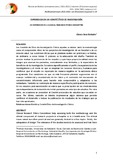Experiencia en un comité ético de investigación
Fecha
2024-04-29Autor
Palabras Clave
Bioética, Comité Ético de Investigación ClínicaBioethics, Clinical Research Ethics Committee
Metadatos
Mostrar el registro completo del ítemResumen
Los Comités de Ética de Investigación Clínica ayudan a valorar tanto la metodología como el componente ético de los proyectos de investigación de un hospital o de un área de salud. Las cuestiones éticas que se plantean suelen ser prácticas y se limitan, de ordinario, a pocos temas. El primero es la adecuación del diseño. También es preciso evaluar la pertinencia de los estudios y que haya proporcionalidad entre los riesgos que asumen los pacientes, normalmente muy limitados, y la expectativa de beneficios de la investigación. Se valora específicamente el perfil y la experiencia de los investigadores y el modo en que se emplean los recursos técnicos y humanos para confirmar que el estudio no repercute de manera negativa en la asistencia clínica programada. Dos cuestiones en que es más frecuente plantear sugerencias son el manejo confidencial y anonimizado de los datos y el contenido del documento de consentimiento informado para hacerlo más comprensible y adaptarlos a los estándares. También se contempla de manera específica la participación de menores. En los estudios post-autorización se valora que la prescripción de los medicamentos sea independiente de la decisión de incluir pacientes en este tipo de estudios. Por otra parte, en ocasiones se presentan al Comité protocolos de estudios que ya están en curso. Por último, también se intenta implementar algún sistema que permita confirmar el desarrollo e incluso la publicación de resultados de los trabajos que ya han sido aprobados.
Información Adicional
| Otros Títulos | An experience in a clinical research ethics committee |
| Correo Electrónico | asrubiales@hotmail.com |
| ISSN | 2244-7482 |
| Resumen en otro Idioma | Clinical Research Ethics Committees help assessing both the methodology and the ethical component of research projects in a hospital or in a health area. The ethical issues raised are often practical and are generally limited to a few topics. Firstly, the adequation of design. The relevance of the studies needs to be assessed and that there is proportionality between the risks assumed by the patients, usually very limited, and the expectation of benefits from the research. The Committee must know the profile and experience of the researchers and the way in which technical and human resources are used to confirm that the study does not have a negative impact on scheduled clinical care are specifically assessed. Two questions in which suggestions are more frequent are confidentiality and anonymized handling of the data, and the content of the informed consent document to make it more understandable and to adapt it to current standards. Post-authorization studies are evaluated in their formal part to confirm that the prescription of medications is independent of the decision to include patients in this kind of study. The participation of under-aged is also specifically contemplated. On the other hand, sometimes the protocols of studies that are already in progress are presented to reach a late approval by the Committee. Finally, an attempt is made to implement some system to confirm the development and eventually the publication of results of the protocols that have already been approved by the Committee. |
| Colación | 1-15 |
| Periodicidad | Semestral |
| País | Venezuela |
| Publicación Electrónica | Revista de Bioética Latinoamericana |
| Sección | Revista de Bioética Latinoamericana: Artículos |






